The recent news
Sept. 15, 2025
Conferences

🌐follow Marie-Anne Frison-Roche on LinkedIn
🌐subscribe to the Newsletter MAFR Regulation, Compliance, Law
🌐subscribe to the Video Newsletter MAFR Surplomb
🌐subscribe to the Newsletter MaFR Droit & Art
____
► Full Reference: M.-A. Frison-Roche, "Compliance Law and Systemic Litigation", 15 September 2025, Madrid.
____
This speech is the opening speech of the event.
🧮 See the general program of the event
____
📅See the slides (not used), basis for this speechs
____
► Summary of the conference: This manifestation, made fo many interventions, is about the role and the evolution of the in-house lawyers in the Europe on the move. I opened the event by focusing on the importance of the Compliance which drives the companies now, in the future and for the future. It is quite difficile because currently Compliance Law is quite misunderstund by almost every. Therefore the first part of my intervention has been the explanation of what is the very new branch of Law, built of political Monumental Goals (Compliance Law is not just the obligation to be conform with, just to obey), the specificity of European Compliance Monumental Goals (not only the sustainability of systems, but also the concern for present and future human beins implied in them).
This systemic new branch of Law, humanist branch of Law in Europe put the Judge at its center.
Par translation, this is creating a new sort of Litigation : the Compliance Systemic Litigation. Its object is the future (as Compliance Law itselft).
Contrary to the "conformity", which might be left to algorithms, Compliance Law, inseparable to Systemic Litigation, are giving new role for Judges, for external lawyers and for internal lawyers.
________
Sept. 10, 2025
Publications
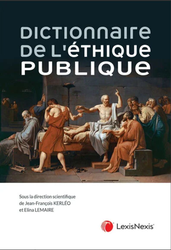
🌐follow Marie-Anne Frison-Roche on LinkedIn
🌐subscribe to the Newsletter MAFR Regulation, Compliance, Law
🌐subscribe to the Video Newsletter MAFR Surplomb
🌐subscribe to the Newsletter MaFR Droit & Art
____
► Full Reference: M.-A. Frison-Roche, "Régulation" (Regulatory Law), in J.-Fr. Kerléo et E. Lemaire (dir.), Dictionnaire de l'éthique publique, LexisNexis, 2025, pp.
____
📗read the general presentation of the Dictionary.
____
📝read the article (in French)
_____
► English Summary of this article defining Regulation: To define Regulation (Regulatory Law), the article begins with its origins, which were a source of misunderstanding, since the term Regulation might refer to simple regulations, thus masking the real branch of Law which is the Law of Regulation. But this confusion with simple and formal regulations has diminished Regulatory Law its importance, its novelty and its originality, and, by placing it within Public Law, equated Regulation on the one hand with the transition from public monopolies to a competitive organisation, and on the other hand privileged the legal study of what fell within the remit of the Administrative Courts, i.e. telecommunications, transport and energy, leaving out the Regulatory Law of banking and financial sector . As a result, the unity and strength of Regulatory Law is still difficult to perceive and manage today, while its relationship with competition and Europe remains difficult.
Regulatory Law is all the more difficult to define because it is still common to oppose, as was the case in the 1980s, "Economic Regulatory Law", which would aim to set economic efficiency objectives within the State, and "Public Liberties Regulatory Law", which would be alternatives to each other, preventing the audiovisual, media and digital sectors in particular from being legally perceived as an industry. We are still paying for this initial conception. All the more so since Regulatory Law is the second pillar on which Europe is built, along with Competition, with which it is linked. It can be identified by the existence of a regulated 'sector', most often through the establishment of a regulatory authority, generally in the form of an Independent Administrative Body. But it is defined by the prevalence of the technical and political goals pursued, which are not spontaneously achieved and which aim to favour the human beings involved in economic organisations.
While the function of Competition Authorities is to maintain the dynamism of competitive markets and to punish behaviour that hinders them without creating that dynamism, Regulatory Law, through its own rules, principles, institutions, procedures and decisions, will create non-spontaneous équilibra and maintain them over time. To do this, it will inject non-spontaneous procedures, such as transparency, or generate obligations and powers because these are necessary for this balance to be achieved. This can take the form of exclusive rights, which can go as far as the creation of monopolies, particularly on transport infrastructures, or the form of pricing and tarification, which can go as far as free access. Access rights are essential, whether technical or political (access to networks, access to healthcare).
The political dimension of Regulatory Law is very much in evidence, as Europe is developing its own form of Regulation compared with the USA or China, demonstrating the link between Regulation and Sovereignty, the criterion? of the technical sector becoming less significant. This is illustrated by the clash over algorithmic systems (AI). In this way, regulation is not a technical reaction to a "market failure", but the manifestation of a zone's political power both internally and externally. The DSA (2022) is an example of this, imposing this same logic extraterritoriality in the digital space through the Digital Services Act (DSA) adopted in 2022.
____
📝read the presentation of the other article written by Marie-Anne Frison-Roche for this Dictionary: "Compliance"
________
Sept. 10, 2025
Publications

🌐follow Marie-Anne Frison-Roche on LinkedIn
🌐subscribe to the Newsletter MAFR Regulation, Compliance, Law
🌐subscribe to the Video Newsletter MAFR Surplomb
🌐subscribe to the Newsletter MaFR Droit & Art
____
► Full Reference:: M.-A. Frison-Roche, "Compliance", in J.-Fr. Kerléo & E. Lemaire (dir.), Dictionnaire de l'éthique publique, LexisNexis, 2025, pp.
____
📗 read the general presentation of the Dictionary.
____
📝read the article (in French).
_____
► English Summary of the article defining what is Compliance: The article explains Compliance in 7 points.
Firstly, it states that Compliance oscillates between a weak and a strong definition. It can be defined weakly as the demonstration of obedience to all applicable regulations, or it can be defined strongly as active participation in the achievement of 'monumental' ambitions for the future of the social group. Positive legal rules and case law are increasingly revealing the relevance of the strong definition, with the weak definition referring only to conformity to the Law.
Secondly, this understanding of the new branch of Law known as Compliance Law will enable us to master the regulations specifically relating to compliance (RGPD, French laws such as Sapin 2 Act and Vigilance Act, AML/FT, European AI Act, etc.), which are both more specific and more restrictive than the general obligation to comply with the applicable legal rules.
Thirdly, everyone can see the move from "extraterritoriality" to another thing which is the indifference to territoryd: Compliance is the right instrument for the digital space and for chains of activities.
Fourthly, this is due to the very nature of Compliance, which consists in internalising in companies in a position to be active the “Monumental Negative Goal” of preventing the collapse of systems (energy, climate, digital, banking, financial, algorithmic, etc.).
Fifthly, this internalisation is carried out by States and public authorities in entities in a position to act, i.e. in concrete terms in companies in a position to be active to reach the “Monumental Goals” by contributing to the improvement of systems so that these systems benefit in the present and the future the people who are de jure and de facto involved in them.
Sixthly, these goals become positive when it comes to educating people about probity and effective equality between human beings, notably through training policies. In this respect, Vigilance is the “cutting edge” of Compliance.
Seventhly, an “ex ante responsibility” of Crucial Operators subject to Compliance is emerging, and is articulated by Systemic Litigation which aims to balance and maintain systems, carried by States and these crucial companies.
____
📝read the preentation of the other article written by Marie-Anne Frison-Roche for this Dictionary: "Régulation"
________
Sept. 6, 2025
Editorial responsibilities : Direction of the collection "Cours-Série Droit privé", Editions Dalloz (33)
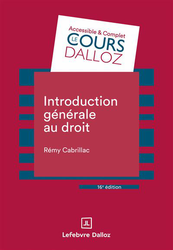
► Référence complète : R. Cabrillac, Introduction générale au droit, 1ière éd. 1995 - 16ième éd., 2025, Dalloz, Coll. "Cours Dalloz-Série Droit privé", 294 p.
____
Le droit est réputé complexe, voire rébarbatif. Pour dépasser cette impression, qui ne correspond pas à sa nature, cet ouvrage, résolument pédagogique, s’adressent aux étudiants qui prennent contact pour la première fois avec la matière.
Il décrit tout d’abord les fondements du droit, ses origines et ses classifications puis il expose les sources du droit, les preuves et le procès.
► Structure du Cours :
- Les fondements du droit contemporain
- Les sources du droit
- La preuve des droits
- Les juridictions civiles
- Le déroulement d'un procès
- La réalisation contentieuses
Il est complété par des tests de connaissances.
____

Aug. 29, 2025
Publications

🌐follow Marie-Anne Frison-Roche on LinkedIn
🌐subscribe to the Newsletter MAFR Regulation, Compliance, Law
🌐subscribe to the Video Newsletter MAFR Surplomb
🌐subscribe to the Newsletter MaFR Droit & Art
____
 ► Full Reference: M.-A. Frison-Roche, Compliance Law and Systemic Litigation, Working Paper, August 2025.
► Full Reference: M.-A. Frison-Roche, Compliance Law and Systemic Litigation, Working Paper, August 2025.
____
📝 This bilingual Working Paper is the basis of the article published in French "Droit de la compliance et contentieux systémique"
____
► Summary of this Working Paper: Legal systems have changed, and Compliance Law, in its uniqueness, reflects this change and plays a powerful role in it. New sets of compliance rules, particularly at European Union level, covering data protection (GDPR), anti-money laundering (AMLA), climate balance protection (CS3D) and banking and financial system sustainability (Banking Union), have been developed and imposed on large companies, which must implement them: alerts, mapping, assessment, sanctions, etc. These new regulatory frameworks only make sense in relation to their ‘Monumental Goals’: to detect systemic risks ex ante and prevent crises so that the systems in question do not collapse, but ‘last’. All the legal instruments in the corpus are normatively rooted in these monumental goals, which are the core that unifies Compliance Law (I).
The judge is the guardian of this new and highly ambitious regulatory framework, which relies on the practical ability of companies to implement it (II). Courts ensure that the legal technical provisions are applied in a teleological manner in each of these compliance blocks and that the regulations support each other, because all compliance regulations serve the same systemic goal: to ensure that the systems (banking, financial, climate, digital, energy, etc.) do not collapse, but sustains, and that present and future human beings are not crushed by them, but rather benefit from them. This unity is still little perceived because so meticulous regulations pulverise this profound unity of Compliance Law into a myriad of changing provisions. Entrusting the ‘regulatory mass’ to algorithms increases this fragmentation, making the whole even more incomprehensible and therefore impossible to handle. On the contrary, recognising the judge's place, i.e. at the centre, makes it possible to master this new branch of law. But the judge's sole function is not to restore clarity to a body of law covered by the dust of its own technicality.
There is a transfer to Litigation of the systemic object of Compliance Law. Indeed, the litigation that emerges from the new Compliance Law is itself fundamentally new, by transitivity. Indeed, the purpose of Compliance Law is to make systems sustainable (or resilient, or robust, depending on the terminology used). This results in litigation that is itself ‘Systemic Litigation’ (III), most often brought by an organisation against a systemic operator. The place and role of each party are transformed (IV).
____
🔓read the developments below⤵️
Aug. 29, 2025
Law by Illustrations
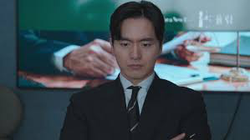
🌐suivre Marie-Anne Frison-Roche sur LinkedIn
🌐s'abonner à la Newsletter MAFR Regulation, Compliance, Law
🌐s'abonner à la Newsletter en vidéo MAFR Surplomb
🌐s'abonner à la Newsletter MaFR Droit & Art
____
► Référence complète : M.-A. Frison-Roche, "Fiction de 🎬𝑳𝒂 𝒗𝒐𝒊𝒆 𝒅𝒖 𝒅𝒓𝒐𝒊𝒕 : peut-on se plaindre quand on a "consenti" à être frappé ?", article de la Newsletter Droit & Art, août 2025.
____
____
► Résumé de l'article : Chaque épisode de la série coréenne 𝑳𝒂 𝒗𝒐𝒊𝒆 𝒅𝒖 𝒅𝒓𝒐𝒊𝒕 ("Beyond the Bar") est un cas pratique en droit.
Celui diffusé le 20 août 2025 a pour titre "Et l'amour est aveugle".
Le cas est une jeune fille qui a donné son consentement par un contrat à être frappée, et filmée, par son compagnon. Elle en porte aussi des cicatrices à vie.
Et veut agir en justice contre lui.
Mais elle a consenti à subir ces violences.
Par contrat.
Ses avocats cherchent le moyen juridique de lui donner des chances de succès devant un juge.
A première vue, ils le lui disent tout net, ses chances sont très faibles, puisqu'elle a consenti.
Y compris à être filmée ; il a gardé les films.
Est-ce une fiction ?
____
🔓lire l'article ci-dessous⤵️
Aug. 20, 2025
Editorial responsibilities : Direction of the collection "Cours-Série Droit privé", Editions Dalloz (33)
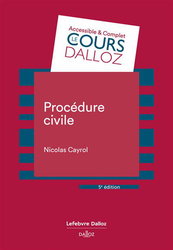
►Référence complète : N. Cayrol, Procédure civile, 5ème éd., Coll. "Cours Dalloz-Série Droit privé", Dalloz, 2025, 569 p.
____
►Présentation de l'ouvrage : L'étude de la procédure civile est indispensable à tous les étudiants désireux d'embrasser une « carrière judiciaire » : magistrat, avocat, huissier, etc. Par nombre d'aspects, la procédure civile est bien, en effet, un droit professionnel, un droit à l'usage des professionnels du procès. La matière figure d'ailleurs aux épreuves des concours et examens d'accès à ces professions.
Mais la procédure civile n'est pas seulement un droit professionnel : elle traite de problèmes qui intéressent tous les juristes, quels qu'ils soient, qu'ils pratiquent ou non la procédure. La connaissance des notions procédurales de base est nécessaire pour la bonne compréhension de nombreuses questions de droit.
___
📚Voir l'ensemble des ouvrages de la même collection "Cours Dalloz -Série Droit privé", créée et dirigée par Marie-Anne Frison-Roche,
et notamment ceux qui traitent des branches du Droit interférant avec la Procédure civile :
📕 Procédures civiles d'exécution
📕 Institutions juridictionnelles
_______
Aug. 20, 2025
Editorial responsibilities : Direction of the collection "Cours-Série Droit privé", Editions Dalloz (33)
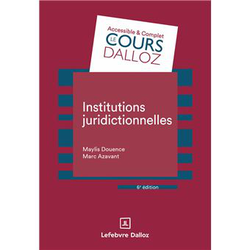
► Référence complète : M. Douence et M. Azavant, Institutions juridictionnelles, 1ière éd. 2010, 6ième éd. 2025, Coll. "Cours Dalloz-Série Droit privé", Dalloz, 2025, 425 p.
____
►Présentation de l'ouvrage : La nouvelle édition de cet ouvrage expose les "Institutions juridictionnelles", expression qui a remplacé heureusement celle "d'Institutions judiciaires", c'est-à-dire les principes, les structures et les personnes qui permettent la réalisation de la mission de trancher les litiges et de dire le droit. Sont ainsi analysés la justice administrative et judiciaire, les juridictions et les acteurs que sont les magistrats et les auxiliaires de justice, notamment les avocats.
L'ouvrage est destiné aux étudiants et à ceux qui préparent des concours administratifs ou par exemple l'examen d'entrée aux Écoles de formation des Barreaux.
____
📚 Dans la même collection, il s'articule avec les ouvrages de :
____
📚 Voir l'ensemble des ouvrages de la même collection 📎"Cours Dalloz -Série Droit privé"
________